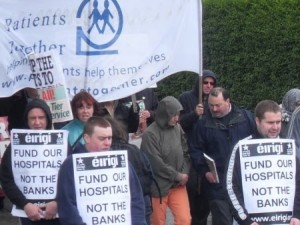Was DMC denied access to bond markets?
DMC CEO Duggan has said the transfer to Vanguard is necessary because Wall Street turned its back when he tried to float bonds to finance upgrades of DMC facilities.
Ryan Beene writes for Crain’s Detroit Business, which has extensively covered the proposed transfer. Keith Crain, CEO of Crain’s Communications, Inc., sits on the DMC board.
“The proposed deal to sell the Detroit Medical Center to Nashville-based Vanguard Health Systems was the product of more than a year’s worth of work by the DMC board of directors to secure the system’s future,” Beene reported in 2009.
He quoted DMC board chairman Stephen D’Arcy, also vice-chairman of Price Waterhouse Coopers, who said the process began in early 2009 when the board needed to invest $200 million in Children’s Hospital of Michigan.
D’Arcy told Beene there were not sufficient capital funds available for the CHM capital improvements.
DMC’s 2009 consolidated financial reports contradict D’Arcy’s statement. Although the reports say the DMC had a deficit in unrestricted net assets of almost$178 million (improved from over $326 million in 2008), they also reported that funds for proposed capital improvements in 2010 were sufficient.
“The financial position has resulted from insufficient payments for services rendered, historical declines in trends in patient volumes, continued provision of services to the uninsured, and the deterioration in the investment markets,” say the reports. “However, based on current estimates of operating results, The DMC management believes that cash flow from operations, funds designated for capital improvements, and board-designated funds will be sufficient to finance both ongoing operations and required capital commitments for fiscal 2010.”
D’Arcy also told Beene, “It became very apparent to us that we could not have access to the bond market.”
Without citing specifics, Beene wrote, “The move would have been costly. The credit markets, the demographics of the DMC’s location and negative perceptions in the city thwarted efforts to obtain favorable terms for a bond sale . . . While the DMC has been profitable for the past six years, its facilities were aging and quickly becoming — or in some cases already were — outdated. Outside consultants suggested that the DMC seek investment from for-profit health systems.”
Beene reported the board unanimously approved the no-bid Vanguard transaction.
In March and August of this year, Moody’s rated DMC credit better than Vanguard’s.
“Vanguard Health Systems, Inc.’s announcement that it has signed a letter of intent for The Detroit Medical Center (Ba3 long-term bond rating, stable outlook) to become part of the Vanguard system has no immediate impact on [Vanguard’s] ratings, including Vanguard’s B2 Corporate Family Rating,” said Moody’s.
“Moody’s had previously cited that Vanguard’s current rating incorporated an expectation of the risk of increased acquisition activity. Therefore, should a transaction transpire with DMC, Moody’s assessment of the impact on Vanguard’s Corporate Family Rating or the rating on any of the company’s debt instruments will focus on issues around terms of any financing plan and pro forma operating expectations.”
Wall Street’s Fitch Ratings firm reported in Sept. 2008 that it had assigned a “BB” (stable outlook) rating to a new issue of $342 million in DMC bonds, as well as outstanding bonds worth $542 million. In 2009, Fitch withdrew its “BB” rating on the 2008 series because DMC never issued the bonds.
DMC press secretary Tiffany Jones said, “For anyone to suggest that DMC could have sold bonds in the fall of 2008, but chose not to is factually false. In fact, non-profit hospital bond issues all over America were canceled because of the economic turmoil. The following year, in 2009, a handful of bond issues went forward, but only those for the highest rated systems.”
Jay Greene, writing for Crain’s, reported in 2009 that two Detroit-related non-profits successfully approached Wall Street.
“In a small sign that the national economy is growing healthier, Henry Ford Health System in Detroit and Novi-based Trinity Health have jumped into the improving bond market by issuing more than $600 million in fixed-rate revenue bonds to refinance debt and reimburse the Southeast Michigan-based systems for past capital expenditures. . . .Detroit’s other major health care systems are either preparing to enter the market or are waiting for their financial situations to improve.”
Henry Ford and Trinity do rate higher than the DMC according to Moody’s, which assigned A1 ratings of some of Ford’s bond issues in 2008, and Aa2 ratings to Trinity’s. But the fact remains that Vanguard rates below the DMC, as well as Ford and Trinity.
After the enactment of Obama’s health care plan in 2014, the scene may change.
Moody’s Investors’ Service reports, “The ultimate credit effect of the recently passed federal healthcare reform for the not-for-profit hospital sector will be negative despite reduced bad debt expense and charity care provided by expanded insurance coverage for previously uninsured patients. The key longer-term challenge for not-for-profit hospitals is the reform’s reliance on extracting long-term cost efficiencies from hospitals, probably resulting in diminished hospital revenues. The trend will become more pronounced over time as key provisions of the law do not become effective until 2014.”
The question of credit for non-profit vs. for-profit hospitals thus becomes a broader one. During the Aug. 28 march for Jobs, Justice and Peace in Detroit, a delegation from the Coalition for Health Care Now carried a banner which demanded, “Single-payer national health care now! Everybody in – nobody out!”
Rose Ann DeMoro, Executive Director of the California Nurses’ Association, is a member of that coalition. In 2008, she denounced the inclusion of the nation’s insurance companies in any national health care plan.
“As premiums have ballooned by 87 percent in the past decade, insurance-industry profits have climbed from $20.8 billion in 2002 to $57.5 billion in 2006. During that same period, health-care interests spent $2.2 billion on federal lobbying, more than did any other sector, and as of last month, had flooded the presidential candidates with over $11 million in campaign contributions to keep the present system intact,” DeMoro said.
 “There’s one alternative that would guarantee coverage for everyone, protect choice of doctor, promote cost savings by slashing administrative waste, and get the insurance companies out of the way. It’s called single-payer reform, as in an expanded and improved Medicare for all. The candidates should demonstrate the courage to talk about this one real reform.”
“There’s one alternative that would guarantee coverage for everyone, protect choice of doctor, promote cost savings by slashing administrative waste, and get the insurance companies out of the way. It’s called single-payer reform, as in an expanded and improved Medicare for all. The candidates should demonstrate the courage to talk about this one real reform.”
The candidates did talk about it, and the debate got extremely heated. But the administration of President Barack Obama, the winner of the 2008 elections, instead enacted a national health plan based on the insurance companies.
Many reports on Detroit’s health care system have assessed the privatization of Detroit General Hospital in 1980 as a poor choice which adversely affected Detroiters’ inclusion in the health care market. Other cities such as New York and Chicago still have publicly-owned hospitals.
The solution for the DMC’s problems, real or not, likely lies not with a takeover by Vanguard, but with a return to the public health care model advocated the Concerned Citizens for Detroit General Hospital, who fought so hard against its privatization, and by the Coalition for Health Care Now.








